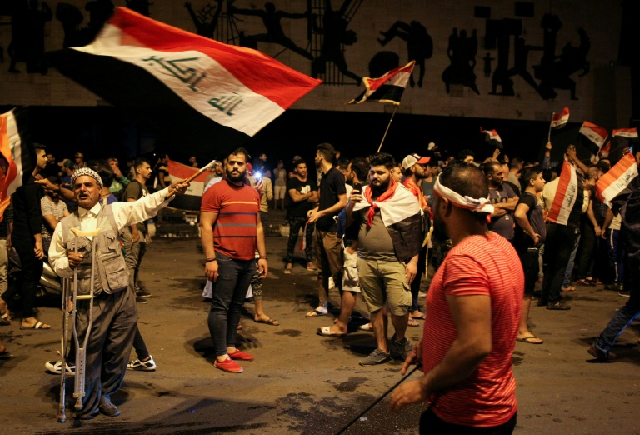
They are expected to balloon further with the full endorsement of populist cleric Moqtada al-Sadr, whose supporters have in previous years breached the Green Zone hosting government offices and foreign embassies.
Protests first erupted on October 1 to demand an end to widespread corruption, unemployment and an overhaul of the political class.
Activists called for the resumption on Friday, which marks a year since Prime Minister Adel Abdel Mahdi came to power and the deadline set by the country's top religious authority for him to enact desired reforms.
One in five people lives in poverty in Iraq and youth unemployment sits around 25 per cent, according to the World Bank.
Iraq PM vows full probe into killings, reshuffle
The rates are staggering for OPEC's second-biggest oil producer, which Transparency International ranks as the 12th most corrupt state in the world.
"I want my share of the oil!" one protester told AFP on Friday morning in the capital's iconic Tahrir (Liberation) Square.
Hundreds had gathered there starting on Thursday night, carrying Iraq's tricolour flag and calling for the entrenched political class to be "uprooted".
The first signal of how the highly-anticipated day could develop will be the weekly noontime sermon issued by Iraq's highest Shia authority, Grand Ayatollah Ali al-Sistani.
But the real test will be the afternoon, when protests typically pick up and when many are expecting supporters of Sadr - an influential ex-militiaman who controls the largest parliamentary bloc - to hit the streets.
"We're not hungry - we want dignity!" a protester shouted in Baghdad, while a third lashed out at "the so-called representatives of the people who have monopolised all the resources".
Overnight, a few dozen protesters headed towards the Green Zone but were pushed back by security forces using water cannons.
Other rallies started in the southern cities of Diwaniyah and Nasiriyah, where demonstrators said they would remain in the streets "until the regime falls".
The movement is unprecedented in recent Iraqi history both because of its spontaneity and independence and because of the brutal violence with which a torrent of protests on October 1-6 was met.
At least 157 people were killed, according to a government probe published on Tuesday, which acknowledged that "excessive force" was used.
A vast majority of them were protesters in Baghdad, with 70 percent shot in the head or chest.
In response, Abdel Mahdi issued a laundry list of measures meant to ease public anger, including hiring drives and higher pensions for the families of protesters who died.
The beleaguered premier defended his reform agenda in a scheduled televised appearance early Friday, telling watchers it was their "right" to demonstrate as long as they did not "disturb public life".
Anti-government protests resume in Iraq after bloodshed
But in an unusually critical tone, he complained that previous governments had not faced the same level of scrutiny and said political figures demanding "reform" had themselves failed to enact it.
Abdel Mahdi's comments appeared to be a reference to Sadr, whose parliamentary bloc calls itself the "Alliance towards Reform".
He called on the government to resign in early October but this week much more emphatically backed the protests, giving his supporters the green light to join them.
Sadr has instructed members of his own paramilitary force to be on "high alert," and they could be seen in parts of Baghdad on Friday in a clear show of force.
Others have backed the government and called the protests a "conspiracy," including the powerful Hashed al-Shaabi paramilitary force whose political branch is the second-largest parliamentary bloc.
Other parts of the country have stayed out of the protests.
Iraq has been ravaged by decades of conflict that finally calmed in 2017 with a declared victory over the militant Islamic State group.
Thus began a period of relative calm, with security forces lifting checkpoints and concrete blast walls and traffic choking city streets at hours once thought too dangerous.
Restrictions had even softened around the Green Zone but were reinstated as the October demonstrations picked up in Tahrir, which lies just across the Tigris River.
Authorities also imposed an internet blackout, which has been mostly lifted although social media remains blocked.




1732538123-0/BeFunky-collage-(90)1732538123-0-165x106.webp)


1732518687-0/Copy-of-Untitled-(78)1732518687-0-270x192.webp)









COMMENTS
Comments are moderated and generally will be posted if they are on-topic and not abusive.
For more information, please see our Comments FAQ